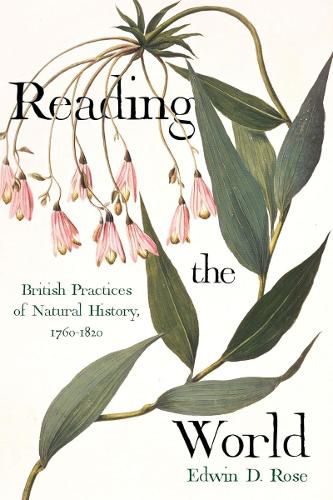Readings Newsletter
Become a Readings Member to make your shopping experience even easier.
Sign in or sign up for free!
You’re not far away from qualifying for FREE standard shipping within Australia
You’ve qualified for FREE standard shipping within Australia
The cart is loading…






How Natural History Connected Diverse Individuals and Information Across the Globe. The last decades of the eighteenth-century witnessed attempts to structure nature with educated landowners dominating the development of the sciences. Many utilized networks of global trade and empire to inventory nature and understand events across the world. Specimens ranging from a North-Welsh bittern to the plants of Botany Bay were collected, recorded and classified. Texts were produced, distributed and used across the globe. Reading the World locates books, natural history specimens and people in a close cycle of literary production to reveal new aspects of scientific practice in the eighteenth-century. Rose uncovers the complex material connections between books, specimens and manuscripts that came to dominate practices of natural history across the British Empire in a period often seen to mark the emergence of a global modernity. AUTHOR: Dr. Edwin Rose is currently an AHRC Early Career Research Fellow in the Department of History and Philosophy of Science at the University of Cambridge and an Advanced Research Fellow at Darwin College Cambridge. 62 b/w illustrations, 10 colour plates
$9.00 standard shipping within Australia
FREE standard shipping within Australia for orders over $100.00
Express & International shipping calculated at checkout
How Natural History Connected Diverse Individuals and Information Across the Globe. The last decades of the eighteenth-century witnessed attempts to structure nature with educated landowners dominating the development of the sciences. Many utilized networks of global trade and empire to inventory nature and understand events across the world. Specimens ranging from a North-Welsh bittern to the plants of Botany Bay were collected, recorded and classified. Texts were produced, distributed and used across the globe. Reading the World locates books, natural history specimens and people in a close cycle of literary production to reveal new aspects of scientific practice in the eighteenth-century. Rose uncovers the complex material connections between books, specimens and manuscripts that came to dominate practices of natural history across the British Empire in a period often seen to mark the emergence of a global modernity. AUTHOR: Dr. Edwin Rose is currently an AHRC Early Career Research Fellow in the Department of History and Philosophy of Science at the University of Cambridge and an Advanced Research Fellow at Darwin College Cambridge. 62 b/w illustrations, 10 colour plates